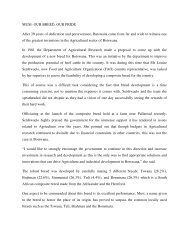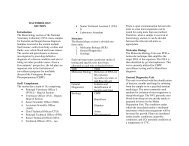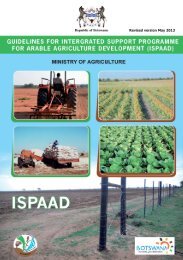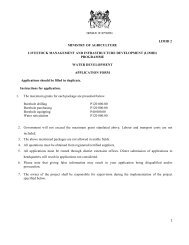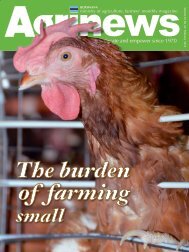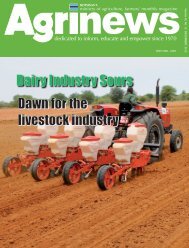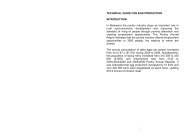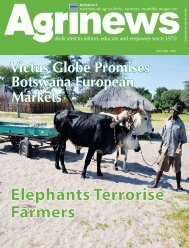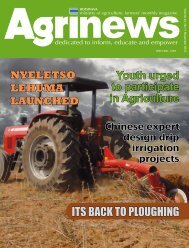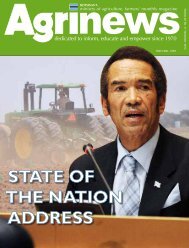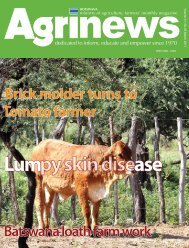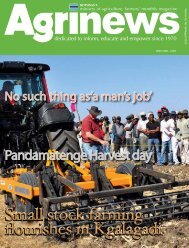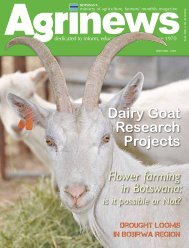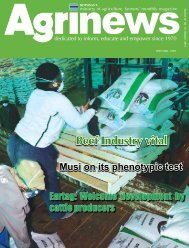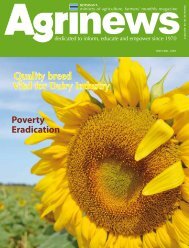GHANZI SHOW - Ministry of Agriculture
GHANZI SHOW - Ministry of Agriculture
GHANZI SHOW - Ministry of Agriculture
You also want an ePaper? Increase the reach of your titles
YUMPU automatically turns print PDFs into web optimized ePapers that Google loves.
After years <strong>of</strong> stumbling along<br />
in the dark, arable farming<br />
could well be on its way to<br />
reclaiming its rightful place as a key<br />
part <strong>of</strong> agriculture space in Ghanzi.<br />
Over the years, the area was dominated<br />
by livestock keeping. However, this<br />
might change as dry land farming<br />
has a potential <strong>of</strong> growth in Ghanzi<br />
district. This was evident at this year’s<br />
Ghanzi show, first time in years there<br />
were around 108 arable exhibitors at<br />
the show. Over the years, the Ghanzi<br />
show has been dominated by livestock<br />
exhibits so the increase in arable<br />
exhibits shows an elevated amount<br />
<strong>of</strong> growth in terms <strong>of</strong> arable farming.<br />
Some <strong>of</strong> their exhibits included<br />
beans, sunflower, oranges,<br />
maize, and groundnuts.<br />
This development could be<br />
attributed to the introduction<br />
<strong>of</strong> the Integrated Support<br />
Programme for Arable<br />
Agricultural Development<br />
(ISPAAD).<br />
Th r o u g h<br />
t h i s G o v e r n m e n t<br />
initiative we could witness dry land<br />
farming being widely embraced like in<br />
the olden times. This was confirmed by<br />
the District Agricultural Supervisor, Mr<br />
Diphetogo Spencer Makuku “people<br />
here were planting but due to lack<br />
<strong>of</strong> harvest they sat back but since<br />
ISPAAD we encounter a tremendous<br />
comeback.” he said. He went on to<br />
say that with the arrival <strong>of</strong> new farming<br />
technologies and free distribution <strong>of</strong><br />
fertilizers people have become very<br />
positive. He added that four people<br />
have even bought<br />
tractors to hire<br />
out to others.<br />
M a k u k u<br />
encouraged<br />
farmers to<br />
e m b r a c e<br />
a r a b l e<br />
f a r m i n g<br />
alongside livestock farming. He<br />
asserted that Batswana cannot live<br />
on milk and meat alone, hence the<br />
need to diversify. Through ISPAAD,<br />
farmers could increase their hectarage<br />
in order to sell surplus as well as feed<br />
their livestock with farm litter. He<br />
noted that Botswana imports a lot<br />
<strong>of</strong> agricultural products. One <strong>of</strong> the<br />
farmers who enjoy the dividends <strong>of</strong><br />
engaging in arable farming is Mr Besa<br />
Dabe <strong>of</strong> Grootlaagte. He describes<br />
himself as a small scale subsistence<br />
farmer who thrives on beans and<br />
maize. He ploughed one hectare <strong>of</strong><br />
beans and harvested eight 50kg bags.<br />
He sold four and kept another four<br />
for consumption and replanting in<br />
the next season. He planted maize in<br />
another half ha <strong>of</strong> which he sold to<br />
the local school. He boasts <strong>of</strong> two first<br />
prize awards he won at the Ghanzi<br />
Agricultural Show for the beans.<br />
Dabe reveals that he planted after<br />
the first rains which start in October<br />
and November. He observed that rains<br />
that come between January and March<br />
are heavy and it is the time when<br />
ngadule (aphids) is most prevalent.<br />
It is very destructive to beans; it<br />
sucks the flower nectar until it wilts.<br />
Moreover, after the March rains<br />
weeds come out in abundance and<br />
are difficult to control.<br />
July 2012



